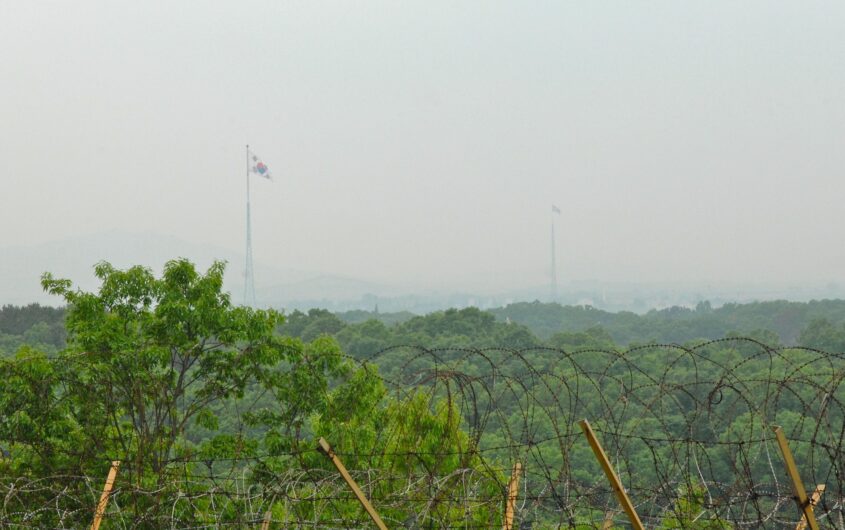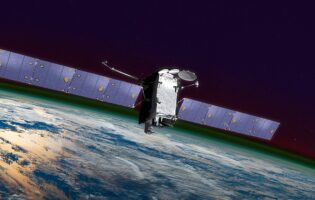
UNC - CFC - USFK via Flickr
Germany’s Accession to the United Nations Command and Why It Matters

Lukas Liebscher
Halle Foundation/AGI Intern
Lukas Liebscher is a Halle Foundation research intern at AGI in fall 2024. He is currently pursuing a Bachelor of Arts in Political Science with a minor in Media Studies at the University of Regensburg, Germany. This fall, he is part of the Washington Semester Program at American University where he is studying international relations, public policy, and the United States. Mr. Liebscher's research focuses on transatlantic relations, foreign and security policy, and global diplomacy. Prior to joining AGI, he worked as a research assistant and later as an office manager for a member of the Bavarian Parliament, where he gained extensive experience in legislative processes, political communication, and public administration. Mr. Liebscher has been actively involved in international projects, such as Model United Nations conferences in Regensburg and New York and the Washington Summer Symposium at the Osgood Center for International Studies in Washington, DC. He has also participated in strategic scenario planning projects, gaining valuable insight into global political dynamics and strategic decision-making. In his free time, Mr. Liebscher is involved with the German Council on Foreign Relations (DGAP e.V.) and student groups in Regensburg focused on international relations and security policy.
The Korean Peninsula has once again become the focus of global attention. This is not only due to an attempt by South Korean President Yoon to impose martial law, which led to his impeachment by the parliament, and the escalation of tensions caused by North Korea’s decision to support Russia in the war in Ukraine by sending soldiers and military equipment. Germany recognizes the importance of developments in East Asia and acceded to the United Nations Command (UNC) on August 2, 2024. Germany’s new engagement on the Korean peninsula is overshadowed perhaps by the reorientation of South Korean policy to provide arms to partners in Europe in the wake of North Korea’s engagement in Ukraine. Until now, South Korea’s defense engagement in Europe has been limited to non-lethal aid and sales to its direct partners. However, with recent domestic political changes, this policy shift now appears unlikely to gain more traction. South Korea seems poised to pivot back toward “Sunshine Politics” and a conciliatory approach toward its North Korean neighbor. All these developments highlight a convergence of geopolitical challenges, with the Indo-Pacific gaining importance in the international security framework and in German foreign policy. Germany’s joining the UNC reflects the evolution of its Indo-Pacific Strategy, first articulated in 2020, which emphasizes the importance of safeguarding peace, ensuring freedom of navigation, and securing global supply chains.
The United Nations Command: History, Mission, and Structure
The UNC was formally established on July 7, 1950, following a series of United Nations Security Council resolutions aimed at countering North Korea’s invasion of South Korea. This marked the first collective security action under the UN framework. Security Council Resolution 84 (S/RES/84) (1950) authorized the creation of the UNC and designated the United States to lead the command. General Douglas MacArthur, then-Supreme Commander for the Allied Powers in Japan, was appointed as its first commander, utilizing the existing Far East Command structures to operationalize the UNC.[1]
During the Korean War, the UNC unified forces contributed by sixteen member states for combat operations, with an additional five nations providing humanitarian aid. Member nations, including the United States, United Kingdom, Australia, Canada, and Turkey, deployed significant numbers of troops, collectively forming a multinational force that reached a peak strength of over 930,000 personnel by the time of the Korean Armistice Agreement in 1953.[2] This figure highlights the breadth of international participation back then, with the United States alone deploying nearly 600,000 troops. Other significant contributors, such as the United Kingdom, added tens of thousands, showcasing the coalition’s global scope.[3] This force successfully repelled North Korean and Chinese offensives, culminating in the 1953 armistice. However, the agreement did not establish a formal peace treaty, assigning the UNC the crucial post-war role of maintaining the fragile ceasefire.[4]
In its post-war phase, the UNC’s mission evolved significantly. It became a critical actor in enforcing the armistice agreement, monitoring the Demilitarized Zone (DMZ), and mediating incidents between North and South Korea. The Military Armistice Commission (MAC) and the Neutral Nations Supervisory Commission (NNSC) were established under UNC oversight to ensure compliance with the armistice. These mechanisms highlighted the UNC’s role as a supporting and organizing force during the Cold War and into the present times.[5]
The establishment of the ROK/U.S. Combined Forces Command (CFC) in 1978 introduced a major change, taking on the primary responsibility for South Korea’s defense while the UNC shifted its focus to maintaining the armistice and coordinating with the UN “sending states” that contributed forces during the Korean War. This transition raised questions about the continued need for the UNC; however, the UNC has maintained a role in managing peace and stability on the Korean Peninsula. Its headquarters are now in South Korea, and its leadership is rooted in the U.S. military command. Beyond its historical roots, the UNC continues to serve as a deterrent to aggression, a monitor of armistice compliance, and a platform for coordinating international efforts in times of crisis. The UNC also serves a diplomatic function. By facilitating communication among stakeholders, the command provides a platform for dialogue that can de-escalate tensions and prevent misunderstandings with the North Korean leadership. The United States periodically undertakes and promotes the modernization and expansion of the UNC.[6]
The UNC has become increasingly important in a geopolitical environment characterized by strategic competition between the United States and China. This dynamic explains South Korea’s initial reluctance to expand UNC membership, which led to the rejection of Germany’s application in 2019, primarily to avoid provoking North Korea. However, a change in government, escalating regional tensions, and North Korea’s involvement in the Ukraine conflict ultimately led South Korea to support Germany’s admission to the UNC.
Germany’s Foreign Policy Shift and Its Indo-Pacific Strategy
The accession to the UNC is a logical next step for Germany in its broader foreign policy realignment in the Indo-Pacific region, signaling greater interest in the region without requiring significant near-term commitments of personnel or equipment.
The Indo-Pacific has emerged as a critical nexus of global trade and geopolitical competition, prompting Germany to articulate its Indo-Pacific Strategy in 2020. This policy framework highlights key priorities: ensuring freedom of navigation, securing global supply chains, and promoting peace and stability in strategically vital regions such as the South China Sea, Strait of Malacca, and Taiwan Strait.
Economic motivations underpin Germany’s increasing involvement in the Indo-Pacific. The region accounts for approximately 40 percent of Germany’s foreign trade outside the European Union, making it central to the country’s economic security. South Korea plays a particularly crucial role in this framework as Germany’s largest trading partner in the region after China and Japan. Bilateral trade between the two nations exceeded 33.9 billion euros in 2023, highlighting the depth of economic interdependence. Germany’s exports to South Korea—dominated by automobiles, machinery, and chemical products—illustrate the importance of maintaining stable supply chains and market access. South Korea’s technology exports, including semiconductors and batteries, are vital to Germany’s manufacturing and energy sectors, further cementing the strategic economic relationship. More importantly, the disruptions caused by the COVID-19 pandemic, Russia’s war in Ukraine, and a potential confrontation with China have further underscored the need to diversify and secure supply chains and market access. Therefore, as Germany seeks to “de-risk” its trade exposure to China, South Korea is becoming an even more important and reliable partner in shifting supply chains away from China. This shift in thinking was first published by the German government in its “Strategy on China” in 2023.
Joining the UNC reflects Germany’s recognition of the interconnectedness of global security challenges, the global economy, and its willingness to engage meaningfully beyond Europe.
Beyond economic considerations, Germany’s Indo-Pacific strategy is also guided by its commitment to multilateralism and international law. German Defense Minister Boris Pistorius, in a statement following Germany’s accession to the UNC, emphasized the importance of “the power of law, not the law of power” in maintaining global order. This alignment with the UNC’s principles highlights Germany’s intent to contribute to a rules-based international order and engage with like-minded partners in the Indo-Pacific.
Germany has taken tangible steps to solidify its Indo-Pacific engagement. For instance, bilateral agreements with Japan in 2024 facilitated simplified troop deployments, while training missions with Malaysia, Indonesia, and Vietnam strengthened regional capacity in medical, engineering, and peacekeeping operations. Additionally, Germany’s decision to deploy naval vessels through the Taiwan Strait and participate in large-scale joint exercises such as Talisman Sabre and Pitch Black demonstrates its commitment to freedom of navigation and regional stability. As Lieutenant General Ingo Gerhartz, Chief of the German Air Force, remarked, Germany’s efforts highlight Europe’s capability to work collaboratively with Indo-Pacific partners.
Germany’s recent inclusion in the UNC therefore complements these initiatives, signaling Berlin’s intent to take on greater responsibility in global security matters while also pursuing deeper economic ties with South Korea to secure its own economic interests. Although its contributions to the UNC are initially small—starting with the deployment of senior staff officers—this step underscores Germany’s changing ambitions.
Shared Challenges
In recent years, the Indo-Pacific region has witnessed a pronounced intensification in security challenges and rhetoric, driven by a combination of strategic competition and assertive actions, which not only threaten regional players but could have global implications. At the forefront of this development is China’s increasingly assertive posture, particularly in the South China Sea (SCS). This assertiveness is most evident in the establishment of overseas military installations, including airfields and naval bases, which bolster China’s military capabilities in these regions. These installations serve as platforms for missile deployment, radar surveillance, and logistical support, effectively enhancing China’s ability to project power across the region. With 24 percent of global maritime trade passing through the South China Sea in 2023 and many states in the region fearing further Chinese expansion, this has drawn significant pushback from other regional actors and external powers.
Adding to this, North Korea’s recent overt support for Russia’s war in Ukraine has further exacerbated an already complex geopolitical landscape. Reports suggest that (as of December 24, 2024) approximately 10,000 North Korean soldiers have joined the conflict, and North Korea has supplied 13,000 containers of conventional arms to Russia since August 2023 as part of their comprehensive strategic partnership, which likely means more North Korean involvement in the future. These actions not only signify a deepening alliance between North Korea and Russia but also have far-reaching implications for regional and global security dynamics.
In response to these developments, South Korea has begun reassessing its longstanding position on military aid to Ukraine. Traditionally, South Korea has adhered to a policy of not directly supplying lethal weapons to combatants. However, President Yoon Suk-Yeol indicated a potential shift in this approach in late October 2024, stating, “We have had a principle of not directly supplying lethal weapons [to combatants] but we can be more flexible and review the policy depending on North Korea’s military activities.” With Yoon now impeached following his unexpected declaration of martial law in early December 2024, his stance may no longer accurately reflect South Korea’s dominant perspective. Even before this controversial move, domestic support for Yoon’s policies, including the direct supply of arms to Ukraine, was notably low. Recent survey data additionally points to the likelihood of a more liberal upcoming government under South Korea’s Democratic Party leader Lee Jae-myung, an advocate of “Sunshine Politics” toward North Korea and balanced politics between the United States and China, which could further challenge and diminish the significance of Yoon’s proposals. However, the outcome remains uncertain as the South Korean Constitutional Court has the ultimate authority to decide Yoon’s future in South Korean politics.
Thus far, South Korea’s military support has been limited to non-lethal aid and sales to Western allies or Ukraine’s neighboring countries, such as Poland, which in 2022 ordered 1,000 K2 battle tanks. A decision to provide direct military assistance to Ukraine would therefore represent a historic policy shift, marking a significant departure from South Korea’s traditional stance. Such a move could heighten existing geopolitical tensions, particularly with China and Russia, while also signaling South Korea’s growing commitment to European and global security frameworks. But with the latest domestic political changes, such a decision seems no longer realistic for the time being.
Conclusion
Joining the UNC underscores a pivotal shift in Germany’s foreign policy, as it moves from a predominantly European focus to assuming greater responsibility for global and economic security. It is the next logical step in aligning its Indo-Pacific ambitions with broader goals. As a result, joining the UNC is more than a symbolic gesture. It reflects Germany’s recognition of the interconnectedness of global security challenges, the global economy, and its willingness to engage meaningfully beyond Europe. By joining the UNC, Germany seeks to contribute to stability in a region critical to its economic and strategic interests, while at the same time cementing its role as a credible actor on the global stage. It also marks an evolution in Germany’s foreign policy, signaling its willingness to participate in addressing global crises that may indirectly affect its national interests. By joining, Germany is demonstrating its commitment to cooperative security efforts, strengthening its international partnerships, and ensuring that its voice is shaping regional outcomes.
[1] Chang-Won Seo, “Comprehensive Security Analysis of the United Nations Command’s Impact on the Security of the Republic of Korea,” 2020, p. 19.
[2] Seo, “Comprehensive Security Analysis of the United Nations Command’s Impact on the Security of the Republic of Korea.”, 2020, p. 92f.
[3] Seo, 2020, p. 92f.
[4] Seo, 2020, p. 21.
[5] Gabriel Jonsson, Peace-Keeping in the Korean Peninsula: The Role of Commissions, KINU Research Monograph 09–15 (Seoul: Korea Institute for National Unification, 2009), p. 62.
[6] Jeongho Nam, US Policy on the UN Command: Analysis on the UNC Dismantlement Decision and Its Reversal (1969-1978) (Singapore: Springer Nature Singapore, 2023), https://doi.org/10.1007/978-981-99-2103-4, p. 86-89.








